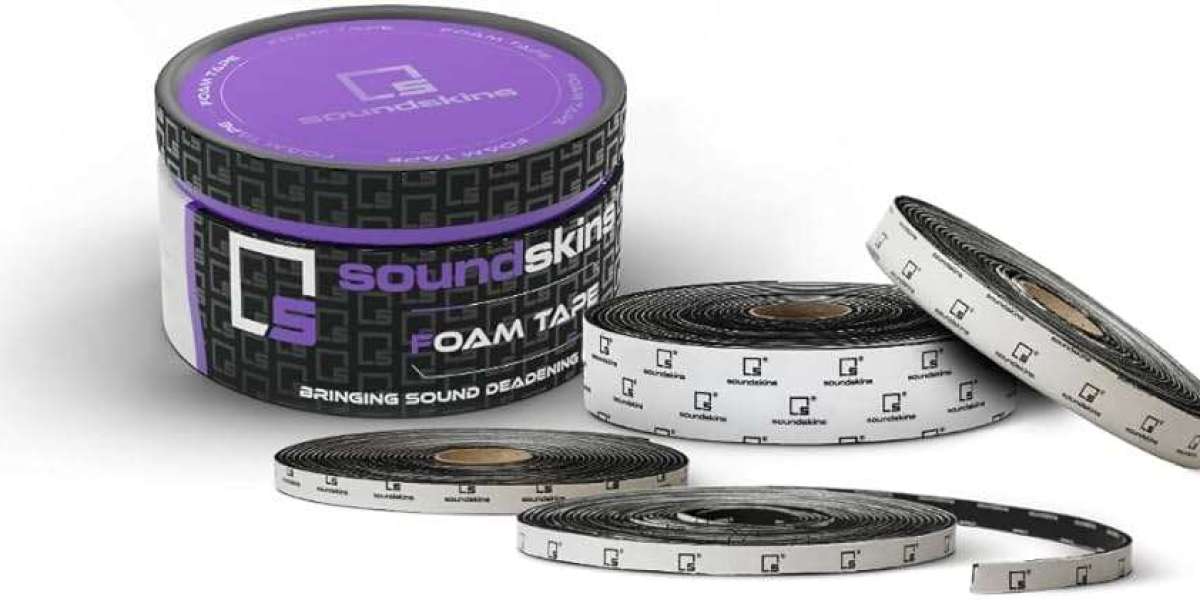Understanding Soundproof Tape
Soundproof tape is a specially designed adhesive tape made from sound-absorbing or sound-dampening materials. Unlike traditional tape, it's thicker, denser, and made for acoustic use. Some common materials include:
Closed-cell foam – to absorb sound waves and vibrations
Butyl rubber – to dampen mechanical noise and rattling
Aluminum backing – for thermal resistance and structural strength
What makes it different from standard tapes is its ability to block airborne noise and reduce vibrations that travel through joints, gaps, or moving parts.
What Makes Soundproof Tape So Effective?
Though it's small in size, soundproof tape solves one of the biggest soundproofing problems—leakage. Even a tiny gap can allow sound to pass through, undoing the hard work of applying mats, panels, or insulation.
Here’s what soundproof tape brings to the table:
? Seals Air Gaps
Around windows, doors, electrical boxes, and HVAC vents, tape ensures there are no unsealed edges.
? Reduces Vibrations
It cushions between metal, wood, or plastic parts that tend to rattle—especially in vehicles or appliances.
? Enhances Acoustic Performance
By preventing sound leakage, it boosts the effectiveness of larger materials like wall panels, foam, or subwoofer enclosures.
? Easy to Apply
No tools, no mess—just peel, stick, press, and you're done.
Where to Use Soundproof Tape
This tape shines in a variety of applications, particularly in spaces where complete sound isolation is difficult. Let’s look at a few scenarios:
? Home Use
Door jambs and frames: Block noise from entering bedrooms, home offices, or nurseries.
Window seals: Stop street noise from creeping in through window gaps.
Appliances: Reduce operational noise from washing machines, dishwashers, or air purifiers.
? Automotive Projects
Door panels: Stop rattles and vibrations.
Around speaker enclosures: Tighten the seal and enhance audio output.
Custom installs: Perfect for lining edges in a dual 10 inch ported subwoofer box or securing wiring harnesses silently.
? Office/Commercial Use
Cubicle partitions: Seal panel joints for better acoustic privacy.
Ductwork & vents: Tape over seams to block sound from echoing through air systems.
Server rooms: Reduce equipment hum and cable rattle.
How to Choose the Right Soundproof Tape
Soundproof tape comes in several varieties depending on the task. Here are a few buying tips:
Material matters: Foam tape is better for blocking airborne sound, while rubber tape is ideal for vibration control.
Check the thickness: Thicker tape typically blocks more noise but may not fit in tight gaps.
Look for adhesive strength: A strong, heat-resistant adhesive ensures the tape won’t peel over time, even in cars or outdoor applications.
Size and width: Choose widths appropriate for the surface you're sealing—narrow for windows, wider for doors or large panels.
Installation Tips for Maximum Effectiveness
Like any acoustic material, soundproof tape works best when installed correctly:
Clean the Surface First
Dirt and grease reduce adhesive power. Use rubbing alcohol for a proper clean.Measure Twice, Cut Once
Use scissors or a utility knife for a straight, clean cut to avoid overlaps or gaps.Apply Even Pressure
Use your hands or a roller to press the tape firmly onto the surface for maximum bond and effectiveness.Seal All the Way Around
For doors or enclosures, ensure full perimeter sealing—missing a single edge can let sound escape.
Soundproof Tape: Small Investment, Big Results
The beauty of soundproof tape is in its simplicity. It’s an easy upgrade that doesn’t require tools or major changes—but still makes a noticeable difference. Whether you're adding it to a room that's already been treated or starting a fresh noise reduction project, this tape acts as the finishing touch that perfects the result.
It’s especially valuable in vehicles, where even small vibrations or gaps can ruin the clarity of an audio system or allow road noise to creep in. A roll of soundproof tape can take a good installation and make it great—especially when combined with full sound deadening kits or subwoofer enclosures.
Final Thoughts
In soundproofing, every detail counts—and soundproof tape is one of those small details that delivers big benefits. From sealing gaps to silencing vibrations, it's an affordable, effective solution for noise control in homes, vehicles, and workplaces.
Whether you're upgrading your home office, building out a truck audio system, or creating a quiet living space, don’t overlook the role of high-quality tape in your soundproofing toolkit.








